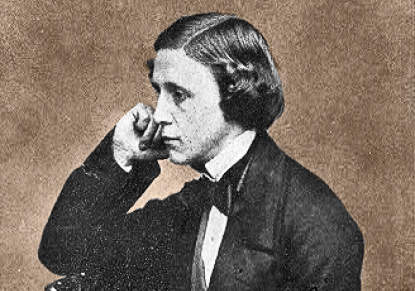
In 1862, Lewis Carroll became friends with George MacDonald, an influential fantasy writer. He quickly grew close to MacDonald’s daughter Mary and wrote many letters to the girl throughout the years. In fact, a cat in Through the Looking Glass is named after Mary’s pet, Snowball. In this letter, Carroll provides Mary with humorous origin stories to many common phrases.
To Mary MacDonald
MS: Yale
Christ Church, Oxford
November 14, 1864
My dear Mary,
Once upon a time there was a little girl, and she had a cross old Uncle—his neighbors called him a Curmudgeon (whatever that may mean)—and this little girl had promised to copy out for him a sonnet Mr. Rossetti had written about Shakespeare. Well, and she didn’t do it, you know: and the poor old Uncle’s nose kept getting longer and longer, and his temper getting shorter and shorter, and post after post went by, and no sonnet came—I leave off here to explain how they sent letters in those days: there were no gates, so the gate-posts weren’t obliged to stay in one place—consequence of which, they went wandering all over the country—consequence of which, if you wanted to send a letter anywhere, all you had to do was to fasten it on to a gate-post that was going in the proper direction (only they sometimes changed their minds, which was awkward). This was called “sending a letter by the post.” They did things very simply in those days: if you had a lot of money, you just dug a hole under the hedge, and popped it in: then you said you had “put it in the bank,” and you felt quite comfortable about it. And the way they travelled was—there were railings all along the side of the road, and they used to get up, and walk along the top, as steadily as they could, till they tumbled off—which they mostly did very soon. This was called “travelling by rail.” Now to return to the wicked little girl. The end of her was, that a great black WOLF came, and—I don’t like to go on, but nothing was found of her afterwards, except 3 small bones. I make no remark. It is rather a horrid story.
Your loving friend,
C. L. Dodgson
From The Letters of Lewis Carroll, edited by Morton N. Cohen. New York: Oxford University Press, 1979.
FURTHER READING
The text of the Rossetti sonnet in question.
More information about Lewis Carroll’s friendship with George MacDonald.


